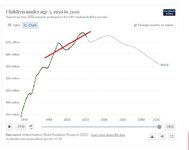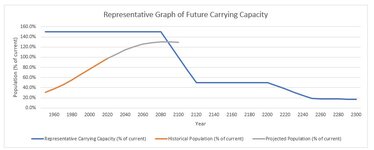As Charles G. Darwin* argued, "voluntary birth control (family planning) establishes a selective system that ensures its own failure. The cause is that people with the strongest instinct for wanting children will have the largest families and they will hand on the instinct to their children, while those with weaker instincts will have smaller families and will hand on that instinct to their children. In the long run society will consist mainly of people with the strongest instinct to reproduce." Voluntarily reducing births is just a stopgap that kicks the can down the road.
(* The quantum physicist, not his more famous grandfather.)
Quantum physicists clearly shouldn't opine about evolution, any more than evolutionary biologists should opine about quantum physics.
If quantum physicists are insufficiently qualified to opine about evolution, the qualifications of rabbit-bandicoots are surely even more inadequate.

This dangerously simplistic "popular science" misconception about how evolution works is flat out wrong; And is particularly popular amongst scientists from fields other than evolutionary biology.
There are no genes for instincts;

Are you from some planet where the life-forms have immaterial souls whose character are formed by their contracausal free-willed choices and/or impressed into them by the grace of a divine heart-hardener? Of course there are genes for instincts; not only that, the notion that there are any instincts animals don't have genes for is creationism. Go ahead, explain by what embryological pathway you imagine an animal could grow a brain that has an instinct it doesn't have genes for.

There are no genes for desired family size;
That is entirely possible and entirely irrelevant. If in fact there are no genes for desired family size it's because back when we evolved our instincts there was no schooling, no birth control, and no understanding that sex causes babies, so there was no mechanism by which desired family size could influence actual family size. That environmental feature of the selection landscape no longer exists. Today desired family size has a huge influence on actual family size; for a lot of us it's the most important contributor. Assuming voluntarily reducing births remains a thing in our species long term, any mutation that slightly changes the odds of a person wanting to reproduce will be under strong selective pressure. So in the event that you are correct that there are no genes for desired family size
right now, well, in a million years there will be.
And evolution works at the population level, particularly for social species,
Evolution works at the gene level, particularly for all species. See Dawkins'
The Selfish Gene.
so even of such genes did exist, the precicted consequence would not necessarily arise.
The same logic and reasoning used by Darwin above predicts that homosexuality will (very rapidly) cease to exist.
Nonsense -- there are any number of mechanisms by which maladaptive traits can persist in a population at low levels. Sickle-cell disease isn't going away any time soon. The same logic and reasoning used by Darwin above predicts that if gay people founded a society that started out 90% gay the incidence of heterosexuality would rise; but homosexuality persisting at the 10% level is perfectly compatible with his logic. Likewise, a society where most people refuse to practice voluntary birth control but a minority who do persists indefinitely is also compatible with his logic.
It also predicts that worker ants and worker bees will die out; Eusociality shouldn't be possible under this stripped down evolutionary theory. Yet many insects and even some mammals have evolved this trait.
It's very rare outside the wasp family, which has anomalous sex-determination rules that favor it. And worker non-reproduction isn't
voluntary in mole rats; it's enforced. Humans could probably prevent the formation of genes for wanting more kids if we collectively decide to make family planning
compulsory. But that's an option (3); it wasn't included in Merle's challenge.
People who don't have children nevertheless contribute to the success (or otherwise) of their genes in subsequent generations, and consequently participate in the evolution of humanity.
And? It's not like having children prevents people from also contributing to the success (or otherwise) of their nieces and nephews. It only takes an epsilon of difference in the contribution to the success of a gene in order for natural selection to have something to push on.
Evolutionary biology is a bit like meteorology; It's the study of a hugely complex and chaotic system, in which predictions are difficult and frequently wrong, but post-facto explanations are surprisingly easy. Ask a meteorologist to predict when the next category four hurricane will hit New Orleans, and he will probably get it wrong. Ask him what caused the last category four cyclone to hit New Orleans, and he can give you a very detailed and specific account.
But he can nevertheless give you a pretty solid answer to the question of whether or not a category four hurricane will hit New Orleans sometime in the next century; The answer is "almost certainly".
True that. And if desired family size continues to have it's recently-acquired influence on reproductive success, will it become an object of selection pressure? The answer is "almost certainly".

ourworldindata.org




